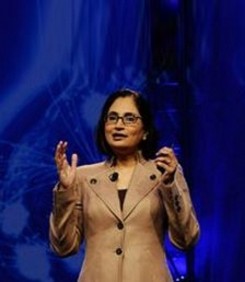Cisco Promises Simplified Product Line And Market Channels

Cisco’s Padmasree Warrior promised to go for gold in the networking race but ruled out storage
Cisco CTO Padmasree Warrior promised further simplification of Cisco’s product line and market channels, and trumpeted the success of the company’s move into servers in a keynote at Cisco Live in London. Later in a question and answer session, she ducked questions about expansion into storage.
“Cisco has three operating systems, IOS [for routers], NX-OS [for its converged data centre products] and XR [for service providers],” she said. “We don’t think there will ever be one OS. The requirements are different.”
Cross-pollinated code
 She did, however, point out that common, platform-independent code would be consolidated into one group: “We are cross-pollinating between IOS and NX-OS, creating APIs in systems so apps can connect quicker.”
She did, however, point out that common, platform-independent code would be consolidated into one group: “We are cross-pollinating between IOS and NX-OS, creating APIs in systems so apps can connect quicker.”
Likewise, Cisco itself has been simplified, dumping its consumer products and conslidating into five lines of business: data centre, enterprise, service provider, collaboration and security.
“We are simplifying the way customers buy our products,” said Warrior (pictured centre, with Olympic 5000m contender Emily Pidgeon – brought in at the left by green screen and telepresence). “We used to be organised by product line.” The leaders in the five areas all have actual spend so they can “manage portfolios”.
Part of Cisco’s consolidation has been its unified computing system (UCS) move, which saw it step into servers, where it now claims to have 17 percent market share, coming third in the market.
The next obvious step might be to enter storage, adding the third major part of data centres, but Warrior said this would not be a good move: “There is a danger in trying to do everything,” she said, no doubt to the relief of current partners EMC and NetApp.
The keynote and “question and answer” sessions hinted at future announcements for tomorrow including the British Innovation Gateway (BIG) which will be a virtual national incubator centre, and an expansion of Cisco Academies, which have been set up in boroughs in London, around the Olympic site.
There was also talk of LISP – a new protocol designed by Cisco engineers, which will be proposed as a standard. It stands for Location ID Separater Protocol, and is designed to let users switch easily between mobile devices on different networks without losing the thread of their work sessions.